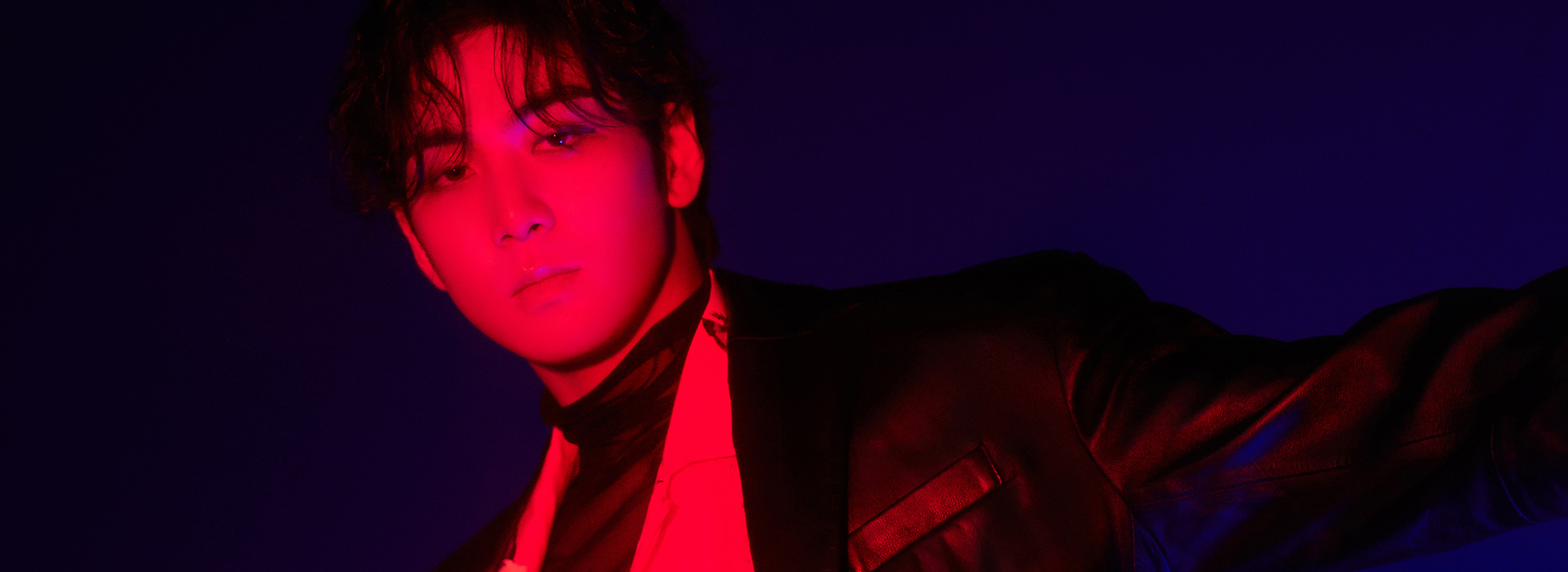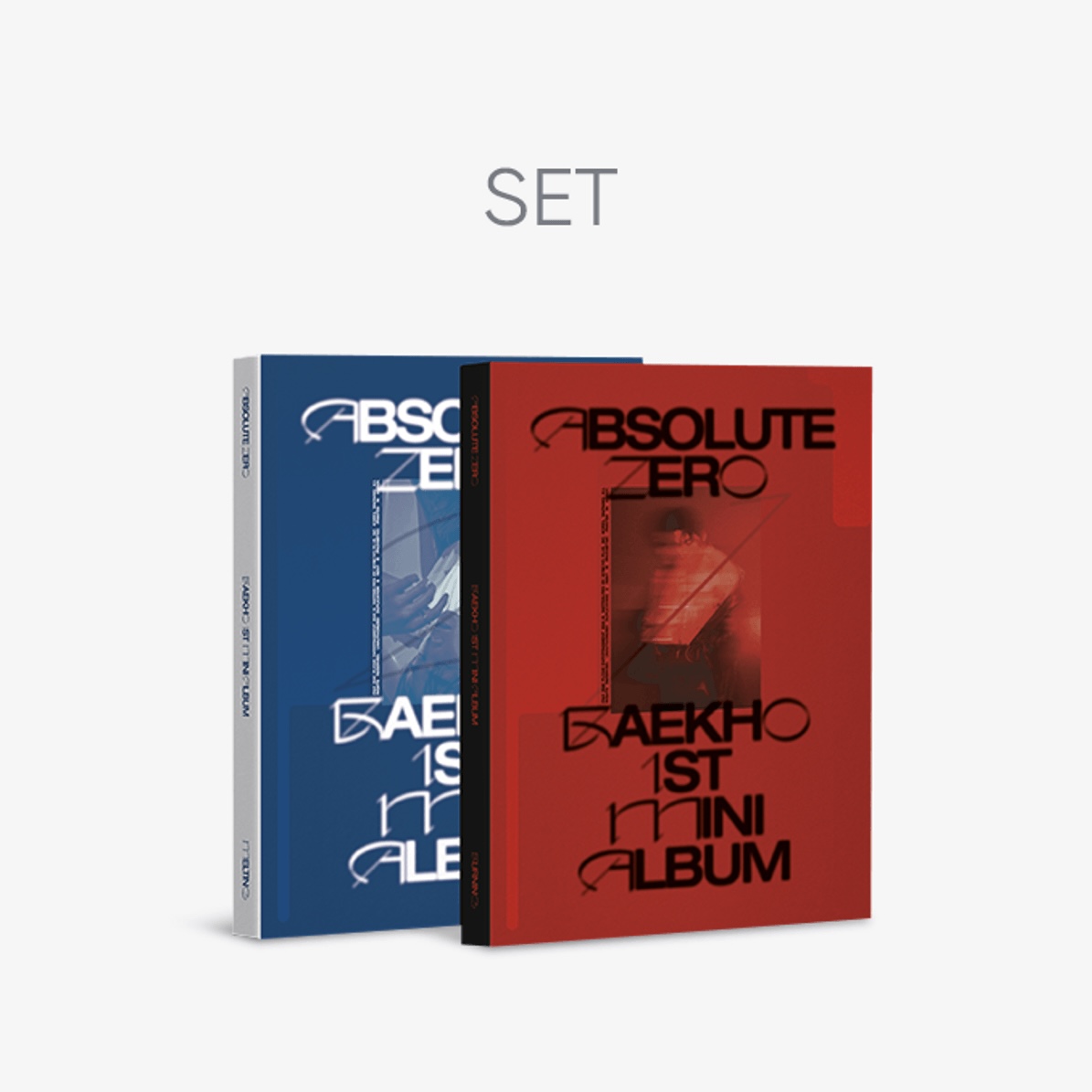
The voice at Absolute Zero
Kim Rieun: One of NU’EST’s signature sounds while they were together was BAEKHO’s impressive high notes, with his powerful voice and pitch adding dramatic tension to the choruses of songs like “OVERCOME,” “LOVE PAINT” and “BET BET.” In “NEED IT,” his solo song off the group’s second album, Romanticize, he sings in falsetto to hit an impressive D#5 (a little over an octave above middle C). Having said that, BAEKHO rarely sings in such a high register on his first solo album, Absolute Zero. He does sing in falsetto for the high notes on “LOVE BURN,” a track off the album comparing violent emotions of love to a burn, but he does it in such a way that his vocals almost become a part of the instrumentation. In “BAD 4 U,” meanwhile, he sings in a softer, lower voice for the climactic lyric, “Bad 4 u Bad 4 me.”
BAEKHO sings the final track of the album, “Am I the One Who’s Changed, Feeling Things Aren’t the Same” (featuring Sik-K), in a raspy, full-throated voice that plays well with the rock guitar, especially in the intro and hook (“I wanna go back / Sorry it’s all my fault / What more can I say / I’ll just do whatever I want / We turning back to those times”). His voice is deliberately mixed to sound like it’s spreading out far back in the track, and sounds like he’s actually holding back his emotions when hitting the high notes. The difference highlights BAEKHO’s ability to express both desperation in his vocals and painful memories of a relationship that’s undergone irrevocable change. BAEKHO proves his strength as a vocalist throughout the entire album in the restraint he exhibits, using his voice as part of the overall soundscape of the songs, exploring the most accurate ways to express the emotions he’s out to convey through fine adjustments to tone, rhythm and even the way his vocals are mixed.
Here we see the change BAEKHO has undergone as he takes his first steps as a solo artist. He gives his most colorful vocal performance in the lead single, “No Rules,” capturing the emotion of the song with a thin falsetto in the introduction, then bringing the rap-like rhythm to life as he sings, “Holding our breath our ocean’s lights on.” He gradually sings louder as he moves into the pre-chorus; then, as he gets to the chorus, singing, “woo baby,” his powerful and distinctive voice is on full display, though he opts for a fairly light falsetto when he peaks at his highest notes. The lyrics throughout the song passionately implore the listener to focus on the love we have right now. By fine-tuning the emotional intricacies of each line, BAEKHO infuses his vocals with a passionate love that nonetheless keeps cool. “No Rules” essentially gives listeners a choice to take it as either an impassioned love song with immersive lyrics or an easy-listening pop song with a highly danceable beat. In a sense, the title Absolute Zero—a state of no molecular energy whatsoever, with no resistance—suggests BAEKHO has drawn a new starting line for himself, starting back at zero to open up infinite possibilities moving forward as he relies on his strengths in completely novel ways.


New Pop Star!
Kang Myungseok: In his first solo album, Absolute Zero, BAEKHO tells a love story from start to finish. The two characters feel a “spark” (“Festival in my car,” the opening track), reach a “boiling point” (“LOVE BURN”) and create a love for each other and, “into your warmth, dive into you” (“No Rules,” the lead single). But once they see “the temperature gap that can’t be closed” (“We don’t care no more”), the two clue into the differences between them, essentially becoming “frozen” (“BAD 4 U”). The closing track, “Am I the One Who’s Changed, Feeling Things Aren’t the Same” (featuring Sik-K), cries an apologetic “sorry” with “belated regret,” but the vocals spread into a void like a shout that echoes all alone. The framing provided by the opener, “Festival in my car”—sounding like an outdoor celebration as different voices chatter away—suggests Absolute Zero can be seen as being akin to a movie or TV show that follows a relationship as it unfolds in a soundscape brought alive by its temperature motif.
When he performs “No Rules,” BAEKHO sits on the right side of the stage, watching the backup dancers and singing, “from now on, woo baby, eternal fantasy is you.” The blocking serves to show his role in Absolute Zero, directing each song as a story through recording techniques that emphasize the stage space and delicately describing the story behind the songs and their characters, ultimately assigning himself to the roles of both director of his personally crafted world and the narrator vocalist. Except for “No Rules,” which is intended to be performed live, his vocals fill the songs like background music for the characters as their stories unfold. The result is an album where every song is wrapped in a calm that spends less time focused on BAEKHO’s vocals and guides listeners to grasp the lyrical story from the viewpoint of each character instead. In the chorus of “LOVE BURN” (“We’re like LOVE BURN, we burn each other bursting harmony”) he captures the intensity of the moment a relationship becomes true love with his dynamic vocals. The song is easy on the ears with repeat listens, though, thanks to the way the audio resonates all throughout. Spreading out across the space created by the music, BAEKHO’s voice makes for an easy-listening experience, and the chorus, with its dynamic melody and vocals, leaves a deep impact on the listener.
All this follows the overall way Absolute Zero sets the mood through beats and a recording style that follows the trends of Western R&B but differs in its use of the dramatic guitar borrowed from rock at moments of rising emotions. The album keeps calm as it tells the story, but also holds onto the powerful emotional energy of the moment to flare up the heart. In between the clean-cut R&B and enthusiastic guitar are a mix of the comfort of easy listening and the passion of the melody. Here, Absolute Zero announces, with a unique flair, the solo debut of its artist: an idol who performs on stage, a vocalist who sings from the depths of his heart and a producer who packages all the tracks of an easy-listening pop album into one neat package. This is the birth of an artist with the approachability of a pop star and all the brilliance of an idol.
This is how you build it up again
Song Hooryeong: In “NEED IT,” his solo song off NU’EST’s 2021 album Romanticize, BAEKHO wrote the lyrics, “In the end, the only end to the pain is me,” and so he wants to “Make it and break it / Build it up and tear it down” again. In an interview he did with Weverse Magazine for the release, he also said, “Whatever it is, that process of making something, tearing it down, building it up again—it’s so universal. These days, that kind of process is okay with me.”
Having started with NU’EST, BAEKHO has now released his first solo album, Absolute Zero, and its appropriately titled opening track, “No Rules,” shows how he’s rebuilding himself as a solo artist. The use of chairs in the choreography for the song naturally harkens back to the spinning-chair choreography of NU’EST’s debut song, “FACE.” In “No Rules,” BAEKHO makes good use of the chairs, backup dancers and various formations to add a narrative arc to the song. As the lyrics plant the song firmly in “endless night,” 10 dancers sit on chairs surrounding BAEKHO below on the ground in a semicircle. By the time he finishes the 20-second dance break and the song is coming to a close, he grabs a chair from center stage and throws it away backstage. This arc in “No Rules” follows BAEKHO as he begins on the floor, moves around the stage and finally stands in the center to finish the song. The whole performance cleverly reveals how BAEKHO, the newly solo artist, is in charge of the song, the performance and even the movements of the other dancers. The purpose of the dancers becomes clear when he makes them dance around him in the middle of the stage to draw attention to himself or when he rests on a chair to watch them dance. He commands attention from the center but also directs the audience to the dancers who help make the performance complete. Though he places himself directly at the center of the performance as the persona singing, “I want you / I need you,” BAEKHO is perfectly aware that the story in “No Rules” isn’t one he can tell alone. When he performs the song, he’s as colorful and lively as he was in his days with a group, but here he truly shines as an individual, bringing everything he has to the stage to create “endless night” and “our ocean”—a place where two lovers can dive into each other’s warmth. In this way, BAEKHO reveals that he seems to know how his solo ambitions, too, are the product of shared insight.
Unauthorized reproduction and distribution prohibited.